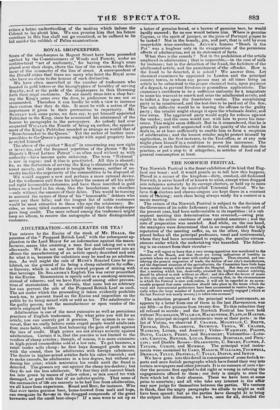ADULTERATION—SLOE-LEAVES OR TEA?
THE seizure by the Excise of the stock of Mr. Hewer, the patentee of the" Prepared British Leaf," with the subsequent ap- plication to the Lord Mayor for an information against the manu- facturer, seems like arresting a man first and taking out a writ afterwards. We do not see how the law should convert into an offence the manufacturing of an article openly,described and sold for what it is, because the substitute may be used as an adultera- tion. As well might the sale of HUNT'S Roasted Corn be pro- hibited, on the ground of its being a cheap substitute for coffee; or Succory, which is sold for the avowed purpose of mixing with that beverage. Dr. SOLANDER'S English Tea was never proscribed by the Excise. Stramonium is openly sold as a smoking-mixture, instead of tobacco; and we have Eye-snuff among other provoca- tives of sternutation. It is obvious, that none but an arbitrary law can prevent the sale of the Prepared British Leaf as such. The act under which the proceeding is taken evidently prohibits mock-tea, to prevent fraud on the Excise and imposition on the public by its being mixed with or sold as tea. The adulterator is the guilty person, not the manufacturer or open vendor of the article employed by him. Adulteration is one of the most extensive as well as pernicious practices of English tradesmen. Pay what price you will for an article, you can scarcely get it genuine. The system is so uni- versal, that we really believe some stupid people would adulterate from mere habit, without first balancing the gain of profit against the loss of credit. High prices are not always security against adulteration. Certain it is, that the practice is not limited to the vendors of cheap articles ; though, of course, it is more extensive in high-priced commodities sold at a low rate. To get business, a retail trader sells cheap : he first buys damaged goods to mix with the sound, then he adulterates with foreign substances. The dealer in higher-priced articles finds his sales diminish ; and to make amends, he adulterates in a less degree, but without re- ducing his price; which maintains his credit until the fraud is detected. The grocers cry out against the cheap tea-dealers; but they do not the less adulterate. We fear they still convert black tea into green by means of yellow ochre; or mix sound tea with damaged, or good with that of an inferior quality. That some of the necessaries of life are scarcely to be had free from adulteration, we all know from experience. Bread and Beer, for instance. Who that eeer tastes genuiae beer, home-brewed from malt and hops, can recognize its flavour in the drugged compounds of the great breweries and the small beer-shops? If a man were to set up as a baker of genuine bread, or a brewer of genuine beer, he would tunny succeed ; for no one would believe him. Where is genuine .Cognac, or the spirit of juniper, or the juice of Portugal grapes to be tasted ? Not in the brandy, gin, and port, that is sold'by even respectable wine-merchants. Accuses famous "Death in the Pot" was a bugbear only in its exaggeration of the pernicious effects of adulteration, not in its statement of facts.
What then is the remedy ? Not in the prohibition of the article employed in adulteration ; that is impossible,—in the case of milk for instance; but in the detection of the fraud, the forfeiture of the adulterated article, and the punishment ofehe offender. How is the fraud to he detected, it is asked? We answer thus. Let chemical examiners be appointed in London and the principal country towns, to whom any person may at all times bring an article to be submitted to the proper chemical tests, upon payment of a deposit, to prevent frivolous or groundless applications. The examiner's certificate to he a sufficient authority for k magistrate to issue his warrant to search and seize the adulterated article, and to inflict a fine upon the fraudulent vendor. The complaining party to be reimbursed, and the test-fees to be paid out of the fine.. The only difficulty would be in tracing the offence to the guilty party ; the retailer might charge it upon the wholesale dealer, and vice versa. The aggrieved party would apply for redress against the vendor; and the onus would rest with him to prove his inno- cence. This might seem difficult. But be it remembered, that he is generally pretty well acquainted with the quality of the article he deals in, or at least sufficiently to enable him to form a suspicion of adulteration ; and the honest retailer might protect himself by application, in the first instance, to the Test-office, or at any rate might place himself in a condition to prove his innocence. The existence of such facilities of detection, would soon diminish the practice, or put a stop to it altogether, in articles of food and of general consumption at least.






















 Previous page
Previous page